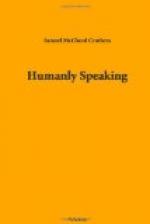HUMANLY SPEAKING
“Humanly speaking, it is impossible.” So the old theologian would say when denying any escape from his own argument. His logical machine was going at full speed, and the grim engineer had no notion of putting on the brakes. His was a non-stop train and there was to be no slowing-down till he reached the terminus.
But in the middle of the track was an indubitable fact. By all the rules of argumentation it had no business to be there, trespassing on the right of way. But there it was! We trembled to think of the impending collision.
But the collision between the argument and the fact never happened. The “humanly speaking” was the switch that turned the argument safely on a parallel track, where it went whizzing by the fact without the least injury to either. Many things which are humanly speaking impossible are of the most common occurrence and the theologian knew it.
It is only by the use of this saving clause that one may safely moralize or generalize or indulge in the mildest form of prediction. Strictly speaking, no one has a right to express any opinion about such complex and incomprehensible aggregations of humanity as the United States of America or the British Empire. Humanly speaking, they both are impossible. Antecedently to experience the Constitution of Utopia as expounded by Sir Thomas More would be much more probable. It has a certain rational coherence. If it existed at all it would hang together, being made out of whole cloth. But how does the British Empire hold together? It seems to be made of shreds and patches. It is full of anomalies and temporary makeshifts. Why millions of people, who do not know each other, should be willing to die rather than to be separated from each other, is something not easily explained. Nevertheless the British Empire exists, and, through all the changes which threaten it, grows in strength.
The perils that threaten the United States of America are so obvious that anybody can see them. So far as one can see, the Republic ought to have been destroyed long ago by political corruption, race prejudice, unrestricted immigration and the growth of monopolies. The only way to account for its present existence is that there is something about it that is not so easily seen. Disease is often more easily diagnosed than health. But we should remember that the Republic is not out of danger. It is a very salutary thing to bring its perils to the attention of the too easy-going citizens. It is well to have a Jeremiah, now and then, to speak unwelcome truths.




